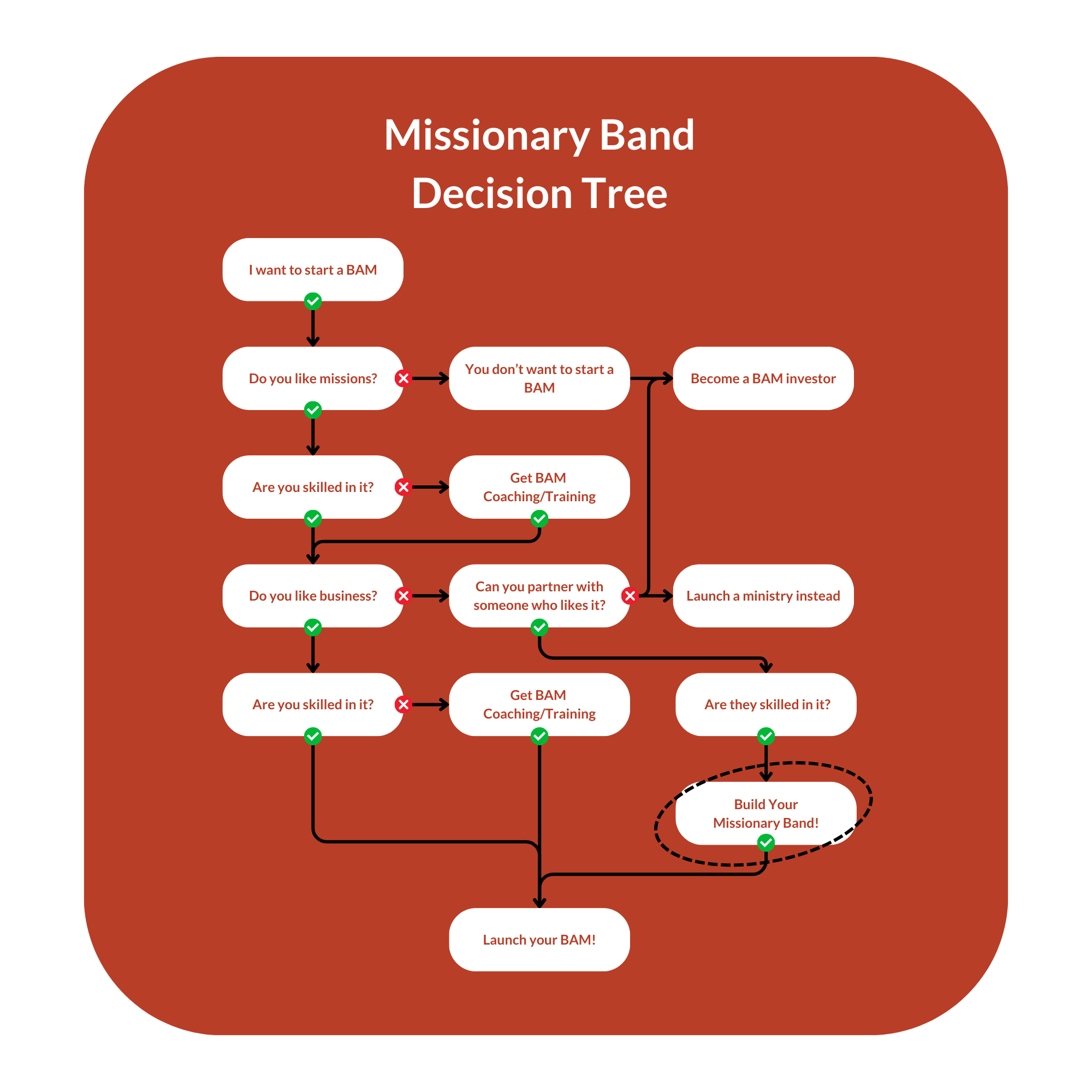Business as Mission: When Business Is Not Your Gifting

“You mean you want me, a seminary graduate, to start a business in a foreign country?!”
“What’s the least amount of time I can spend working in my business if I’m going to do BAM?”
“I’m not a business person. I’m a pastor who is trying to learn language, assimilate to a new culture, raise a family, network with churches… I don’t even know how to get groceries properly here, and now you want me to be an entrepreneur, too??”
“Can’t we just pay someone else to run the business while I do the ministry work?”
These and a litany of other painful writhings are the voices of many missionaries as they learn that the business world is hitching a ride on the back of God’s “already uncomfortable call.”
BUSINESS ISN’T FOR ME
When I talk with many would-be entrepreneurs about the steps ahead, a common thread arises about whether there is a better way to accomplish the task at hand. And I’m quick to offer the alternatives.
Believe me. I love business as mission as much as anyone, but as a BAM coach, my primary task is to help people accomplish the mission of God, not to convince them to be a business professional. One of the first questions I ask these would-be-bammers is, “Are you passionate about this business? And if not, who can be?”
If entrepreneurship is not your passion, then who can you recruit to your team to run the business? Paul writes in I Corinthians 12 that we are the body of Christ and God has given different giftings to different members of the body. If we believe that, then we must believe that a missionary team should also be diverse.
Maybe you’re lucky enough to have several ministry-background believers with experience in different levels of business. One who is willing to do the accounting. One who has some marketing experience. One who is comfortable with operations. Great!
But what if your team had a business-background believer who was passionate about running a business and preferred to take a back seat in ministry while you lead the missions initiatives? This is what Mike Baer, BAM pioneer and founder of Third Path Initiative, calls the “Missionary Band.”
DEFINING THE BAND
The Missionary Band is the marrying of business-background believers and ministry-background believers in a mutual business partnership for a common ministry goal.
Take a missionary visionary with high missiological skills and pair that with a passionate, skilled entrepreneur, and the resulting work is the beauty of the body of Christ in action. While the ministry-background believer may take the lead in this diverse missions team, prioritizing the task of making disciples and planting the church, they may elect to appoint a business-background believer to lead the business charge.
As far as the BAM is concerned, the missional team lead may head up HR or take a seat on the board of directors making recommendations about the spiritual and relational health of the business.
And as far as the ministry is concerned, the business-background believer may volunteer to assist outreaches, lead the occasional prayer meeting, and assist the team in discipling new believers and encouragement of the church.
In either case, both individuals are committed to a common goal, while each takes concern for varying, subordinate metrics.
Consider the following Missionary Band decision making tree:

A NEW APPROACH TO BAM
In a previous article, I proposed that the next generation of missionaries would follow a more natural progression to the mission field. Rather than becoming a pastor and then reskilling as a business person, what if a business person simply took his business from his home country and franchised or transplanted it among a people who have never heard the gospel?
Certainly not all businesses are translatable, and multinational corporations (MNCs) spend years researching before they integrate their model into a new cultural context. But there is no doubt that an American electrician will have a leg up starting an electrical contracting business in North Africa over an American pastor who potentially has never even spliced a wire.
In this way, the concept of the Missionary Band proposes that a business person takes charge of the entrepreneurial endeavors of the missions team. Perhaps that means that the business person is the pioneer who lays the groundwork for the missional employee to come behind.
I am sure that in many cases in our current landscape, the business person will come after the missionary pioneering has begun. However, in either case, we must encourage the church to raise up a generation of business people who see their business skills as an integral part of the mission of God in the world.
JEFF’S STORY
I remember the matter-of-fact tone in his voice when Jeff1 told me that, after years of running a business overseas, he and his family had returned from the field because they were simply burnt out.
“We didn’t come to the field to be business people,” he said. “I don’t think my wife would have ever gone in the first place if we had known it was going to be like that.”
It’s always hard for me to hear words like Jeff’s because the fact of the matter is that the business is the ministry platform. It is a relationship engine, a powerful point of access, and a value vehicle for the community.
Nevertheless, I sympathize with Jeff’s experience. The business was not his skillset. His wife was never on board with that kind of ministry. He wasn’t prepared for the long hours it was going to take to launch a start-up well, the countless small failures, pivots, and necessary training before those deep relationships and missional opportunities arose.
Unfortunately, Jeff and his family walked away from that experience believing that BAM cannot be done. I wish that he would have reached out for coaching before he quit. But I share this story because I also believe Jeff would have thrived as the ministry lead in a Missionary Band, with a business-background believer spearheading the details and paperwork that dragged him down to that eventual burnout.
DIVIDED WE FALL
There is one other takeaway from Jeff’s story that I hope bothers you as well, and that is the presence of sacred vs. secular thinking. We must dispel the popular myth that some are called to “ordinary lives” in the business world and others are called to ministry. If you are saved by grace, you are the light of the world. You are called to ministry.
And by the same token, you were made in the image of a working God. You were created to create. Now, please don’t misunderstand me as belittling those who work full-time at a church, insinuating they should take a second job in the business world (or vice versa).
What we see in Jeff’s story is that no one can do full-time business work and full-time ministry outside of the business! Business as missions must be, for the BAM practitioner, both business and ministry in and of itself. Marketplace skills are missionary skills, and we need to do a better job of reimagining the two working hand-in-hand, whether we are working at a church in Seattle or a start-up in Mumbai.
HOW CAN WE DO IT
As a final note, I want to encourage that it is okay for the various aspects of the Missionary Band to vary in relation to its team member’s strengths. For some, both individuals will make use of a sending organization that will own the business and subsequently employ the team. For others, a business person may provide the investment capital, and in other cases, the business may have many individual investors.
Sometimes the business may provide full-time employment for everyone initially, and sometimes certain team members will supplement their income with church support in order to meet their ministry goals. In each of these ways, the beauty of the body of Christ and the strength of a diverse team come together with business and pastoral skills joined together in one singular purpose.
There is no doubt about it. Starting a business in another country is just plain ol’ hard. But you don’t have to do it alone. You can get a coach. You can take BAM courses. You can get funding that comes with high level BAM advisors. You can assemble a team of ministry and business background believers to work together for the common goal.
This is the Missionary Band, the symphony of believers with business and administrative skills, drumming to the tune of the missionary song, and a choir of five-fold ministry giftings joining in joyful assembly, all following the lead of the Master Conductor.



